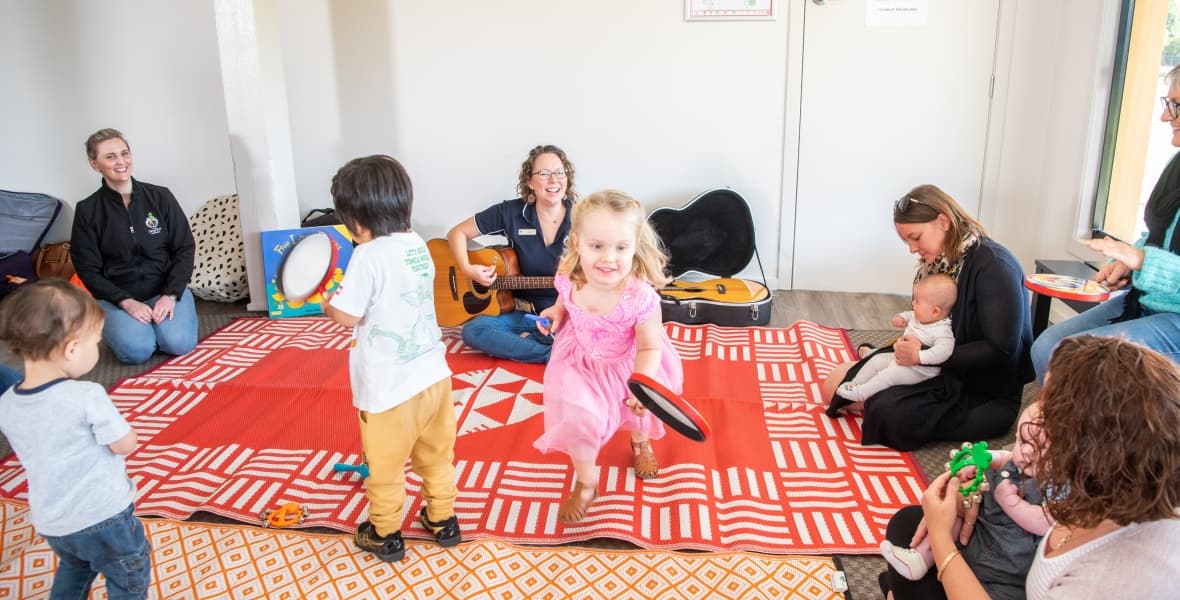Understanding Children
The impact of a music therapy program on parenting capacity and child development outcomes

Freya Lucas
Nov 09, 2020
Save
This short article presents the results of Sing&Grow’s evaluation into impacts on caregiver capacity and child development outcomes.
Families with signs of vulnerability can experience barriers to engaging with support services, which can affect their ability to build their capability as caregivers. This short article outlines an evaluation of the Sing&Grow program, highlighting how this music therapy program positively affects caregivers’ capacity and improves child development outcomes.
What is Sing&Grow and what does it aim to do?
Sing&Grow(link is external) is an evidence-based music therapy program supporting young children and families to use music for building relationships, increasing community connection and facilitating childhood development outcomes. Through music-based play and reflective discussion, the 8-week program works to:
- build caregiver capacity, awareness and confidence
- improve the quality of parent–child interactions
- enhance social connectedness
- improve children’s resilience, self-regulation, social skills and learning outcomes.
Research has shown that Sing&Grow improves parent mental health, parenting behaviours and children’s social and communication development (Nicholson, Berthelsen, Abad, Williams, & Bradley, 2008; Nicholson, Berthelsen, Williams, & Abad, 2010; Williams, Berthelsen, Nicholson, Walker, & Abad, 2012).
What’s the evaluation about?
Responsive parenting or responsiveness is an essential parenting tool where the caregiver is able to observe and respond promptly and appropriately to a child’s cues, thus supporting children’s cognitive development (Eshel, Daelmans, de Mello, & Martines, 2006). Higher levels of active music making with young children in the home has been linked with important outcomes at the transition to school including prosocial skills and attentional regulation (Williams, Barrett, Welch, Abad, & Broughton, 2015). Therefore, changes in these practices are important mediating pathways for families.Over two terms in 2019, Sing&Grow partnered with the Faculty of Education at Queensland University of Technology (QUT) to conduct a national evaluation project. Using pre- and post- surveys and follow-up interviews, this evaluation sought to understand how the program affects caregivers’ capacity to be responsive to their children and their sense of parental self-efficacy, as well as the impact on children’s self-regulation and families’ use of music in the home.
Across Australia, 318 families completed pre-surveys in Week 1 of the program, and more than half (57%) of these families also completed post-surveys in Week 8 of the program. Survey questions related to caregivers’ confidence to participate in parenting support or parent–child programs, knowledge of child development and experience of connection with other parents, each on a 5-point Likert scale. Follow-up semi-structured interviews were conducted with 10 families.
What are the main findings?
Across the families surveyed, the results(link is external) showed there were statistically significant improvements in parent-reported:
- parent self-efficacy in discipline and play
- use of music at home
- children’s cognitive self-regulation.
For those families who were below the mean in the pre-survey, the results showed statistically significant improvements in parent-reported:
- parent self-efficacy in nurturance
- parent responsiveness
- children’s behavioural self-regulation
- children’s sociability and pro-social skills
- children’s internalising problems.
In the interviews, families reported increased social connectedness, inclusivity, belonging and sense of confidence. As one parent described:
the social side of it can't be underestimated … we've ended up as a really close-knit group where all the parents are connected ... And it all came out of the Sing&Grow program.
Parents also reported feeling better equipped to respond to their children’s developmental needs. One mother noted:
[if my child is] having a really bad day … and something like changing a nappy is just the hardest task in the world, I use those songs and I'll sing them to her and … she just chills out.
What do the findings mean?
The results of this study support the use of music therapy groups for improving parenting self-efficacy and children’s development. Adding to the results of earlier research (Nicholson et al., 2008), this evaluation shows Sing&Grow demonstrates statistically significant improvements in parent self-efficacy in discipline and play, the use of music at home, and children’s cognitive self-regulation (Williams, Savage, & Nielson, 2019).Given the known links between these positive parenting attributes, family functioning and child development, these key changes in early parenting are likely to set the scene for positive family trajectories over time. The significant improvements in parents’ use of singing in the home is considered particularly important, given the known associations between this home learning activity and attentional regulation and prosocial skills for children (Williams et al., 2015). The improvements in children’s cognitive self-regulation have positive implications for children’s school readiness, and parents’ use of music in the early years is a strong predictor of later childhood educational and wellbeing outcomes (Williams & Berthelsen, 2019). This evaluation also highlights the Sing&Grow program’s particular effectiveness for families who have the greatest need.
The Australian Institute of Family Studies (AIFS) on behalf of the Commonwealth of Australia are the copyright holders of this work.
The work has been re-shared here under CC BY 4.0 licencing, and with express permission of both AIFS and the authors.
The original work may be accessed here, alongside copyright information from AIFS, which may be found here.
Don’t miss a thing
Related Articles



















